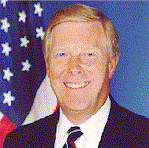
Gephardt, Lofgren and Eshoo Write Clinton on Encryption Bill
(September 14, 1999) Representatives Richard Gephardt, Zoe Lofgren and Anna Eshoo wrote a letter to President Bill Clinton today urging him to support HR 850, the SAFE Act.
| Related Pages |
| HR 850 IH (SAFE Act). Summary of HR 850. Letter to Clinton. |
HR 850 IH, the Security and Freedom through Encryption (SAFE) Act provides that people in the United States can use any kind of encryption. It also provides that any person in the U.S. may sell in interstate commerce any encryption product. Moreover, the government cannot mandate any kind of key escrow. Finally, the bill liberalizes encryption export restraints.
The bill is vigorously opposed by the FBI, the NSA, the Justice Department. Louis Freeh, Janet Reno, Barbara McNamara, and other representatives of the Clinton administration have testified and lobbied extensively on Capitol Hill in an effort to defeat the bill. However, Bill Clinton has publicly avoided the topic. He has not publicly threatened to veto the bill.
 |
|
| Rep. Gephardt |
The letter stated that "We are writing to you on behalf of the members of the House Democratic Caucus who support H.R. 850, the Security and Freedom Through Encryption (SAFE) Act. This is an issue of great importance to continued U.S. leadership of a vital segment of our economy, the high-tech industry. As we look toward possible House floor consideration of H.R. 850 this fall and ever growing support for passage of the bill in the 106th Congress, we believe that it is time to seek your leadership and involvement on this issue. To that end, we are requesting a meeting with you in the next week to discuss how to make progress on the encryption issue this year."
Rep. Richard Gephardt (D-MO) is the House minority leader. Rep. Zoe Lofgren (D-CA) and Rep. Anna Eshoo (D-CA) both represent Silicon Valley, and are active on a variety of high-tech issues. Rep. Lofgren is also the lead co-sponsor of the SAFE Act. Rep. Bob Goodlatte (R-VA) is the sponsor.
 |
|
| Rep. Zoe Lofgren |
The letter continued that, "We recognize that opponents of H.R. 850, including several senior members of your Administration, have raised national security and law enforcement concerns regarding this legislation. While we respect these individuals and the expertise that they bring to this debate, we believe that their opposition fails to fully appreciate how important strong encryption is to protecting the integrity of our national information infrastructure, ensuring the privacy of our citizens personal communications over the Internet and enhancing the safety of their electronic commerce transactions."
"Strong encryption actually provides vital support for both law enforcement and US national security. Thus, passage of the SAFE Act is wholly consistent with our desire to protect and support our national security and law enforcement interests in the Information Age and the coming millennium."
"It is critical that our laws not unduly penalize American companies and disadvantage them in the global technology marketplace. You have recognized this as your Administration has taken important steps over the past several years that have gradually allowed for the export of stronger encryption technology. But if we hope to maintain the U.S. technological edge, we must do more. We must change our current encryption policy that needlessly places American companies behind the curve of technological advancements and international competition."
The letter concluded, "We look forward to meeting with you at your earliest possible convenience."
A staff assistant to Richard Gephardt told Tech Law Journal that Gephardt would like the House to vote on the bill as soon as possible. However, he added that the Republican leadership controls the calendar.